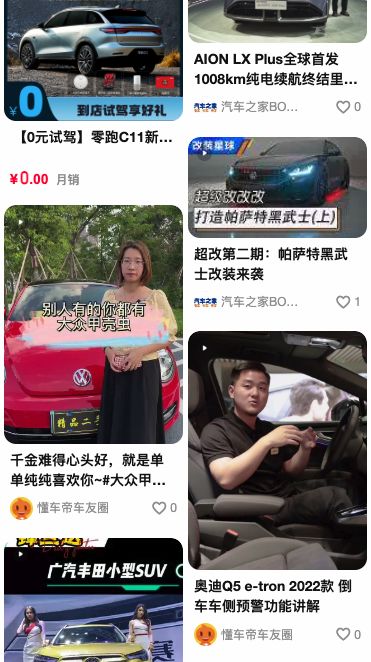通用feeds组件封装技巧
前端交互中,无限滚动feeds流是最常见的交互形式,常见的feeds功能上基本都包括兜底、接口请求、报错提示、刷新、feeds卡片排列规则等。用户滑动页面不断加载feeds数据, DOM节点不断累加创建,因为DOM节点过多,导致页面数据更新时卡顿问题, 一般会通过虚拟滚动减少页面DOM数量来解决。这些必要基础能力在每个feeds流需求中都存在,所以我们决定将feeds这一场景抽离成公共组件,提高开发效率。
需求分析
▐ 需要支持模块多种排布形式
通过对现有项目汇总分析,根据feeds流中填充模块高度是否固定、排布方式列数不同可以划分为:一排一定高、一排一不定高、一排二定高、一排二不定高。
pic1:模块排布方式
一排一定高:高度固定, 模块依次向下排列
一排一不定高:不通类型模块高度不固定, 模块依次向下排列
一排二定高:高度一致, 两列排列
一排二不定高:不同类型模块高度不固定, 模块总是排布在最短的一侧
▐ 需要支持不同类型数据, 渲染不同模块
feeds中一般会穿插多种类型数据,需要针对不同的数据,有不同的UI展示,比如下面feeds中,有图文、商品、视频。组件内默认每个模块存在type字段,进行不同类型区分。
▐ 针对性能优化,组件内置虚拟滚动
当页面滚动时,会不断加载新的feeds数据,将数据渲染在页面上,这必然会在页面中渲染大量的DOM节点,当页面中DOM数量超过一定数值,数据变更导致页面重新渲染时,会造成页面的卡顿,常见的feeds场景下针对大量DOM节点的优化方案是虚拟滚动,所以需要这一性能优化,集成在feeds组件中。
实现细节
▐ 排布方式不一致实现
高度问题解决方案
如果模块固定高度,则直接传入750设计稿下的模块高度即可
如果模块不定高,则需要按照模块类型不同,传入当前类型模块的高度计算规则
排列方式解决方案
为了兼容一排二不定高情况下,模块总是排列在最小高度的一边,所以模块的排列全部使用定位的方式进行模块布局
模块是一排一或者一排二,使用组件时,传入对应类型即可
组件使用方法
{
if(item === 'video') {
// .... video场景下高度计算逻辑
} else if(item === 'banner') {
// .... banner场景下高度固定300
return 300
} else {
return xxx
}
}}
> 核心实现代码
const calculateItemStyle = function (componentStyles, data, { itemSize = undefined, model = 'fixed' } = {}) {
if (typeof itemSize === 'undefined') throw new Error('itemSize 为函数或者数字');
if (model === 'fixed') { // 单列
data.forEach(item => {
const size = typeof itemSize === 'function' ? itemSize(item) : itemSize;
const lastItemSize = componentStyles[componentStyles.length - 1] || { top: 0, height: 0 };
componentStyles[componentStyles.length] = {
left: 0,
top: lastItemSize.top + lastItemSize.height,
height: size,
width: '100%',
};
});
} else { // 多列
const calculateGridPosition = (function () { // 计算多列情况下, 页面布局
let leftFeeds = 0; // 变量命名
let rightFeeds = 0;
const stylesLength = componentStyles.length;
if (stylesLength > 0) { // 说明已经存在数据
const lastStyle = componentStyles[stylesLength - 1];
if (lastStyle.direction === 'left') { // 说明最后一个是在左边
leftFeeds = lastStyle.top + lastStyle.height;
} else {
rightFeeds = lastStyle.top + lastStyle.height;
}
// .....
}
return (styles, size) => {
let itemStyle = null;
if (leftFeeds <= rightFeeds) { // 左边小, 放左边
itemStyle = { left: '0', top: leftFeeds, direction: 'left' };
leftFeeds += size;
} else {
itemStyle = { left: '50%', top: rightFeeds, direction: 'right' };
rightFeeds += size;
}
styles[styles.length] = {
left: itemStyle.left || undefined,
top: itemStyle.top,
height: size,
width: '100%',
direction: itemStyle.direction,
};
};
}());
data.forEach(item => {
const size = typeof itemSize === 'function' ? itemSize(item) : itemSize;
calculateGridPosition(componentStyles, size);
});
}
return componentStyles;
};▐ 支持不同类型数据, 渲染不同组件能力
提供组件注册能力,只需要将组件注入到feedsComponent中,组件内会按照数据不同,渲染对应类型的模块。
组件使用方法
feedsComponent.registerComponent({
video: Video,
item: Item
})核心代码实现
let feedsItemMap = {}
function Feeds(props: Props) {}
Feeds.registerItemComponent = function (componentMap: { [key: string]: any }) {
feedsItemMap = componentMap;
};
{
data.map(item => createElement(feedsItemMap[item.type], {
...item,
index,
})
})
}
▐ 虚拟滚动实现
用户滑动页面的过程中,获取当前滚动高度,结合《排布方式不一致实现》章节中,在数据初始化时已经计算好模块应该排布的位置,找到当前可视区域内符合条件的开始和结束的index,渲染在页面中。
核心代码实现
useEffct(() => {
const onScroll = throttle(() => {
const { scrollTop, clientHeight, scrollHeight } = document.documentElement;
// 根据当前页面scrollInfo, 获取显示数据的startIndex和endIndex
const { startIndex, endIndex } = getRenderDataIndex(feedsItemStyles.current, scrollInfo);
// ...
}, 200)
window.addEventListener('scroll', onScroll);
}, [])
// utils/index.js
const findTargetIndex = function (styles, target) { // 二分法 找到大致接近的top的元素index
const n = styles.length;
let left = 0;
let right = n - 1;
let ans = n;
while (left <= right) {
let mid = (Math.floor((right - left) / 2)) + left;
if (target <= styles[mid].top) {
ans = mid;
right = mid - 1;
} else {
left = mid + 1;
}
}
return ans;
};
const getRenderDataIndex = (feedsStyles, scrollInfo) => {
const {scrollTop, clientHeight, scrollHeight} = scrollInfo;
const start = scrollTop < 0 ? 0 : scrollTop; // 开始位置
let end = 0; // 结束位置
if ((scrollTop + clientHeight) > scrollHeight) { // 说明没有东西了
end = scrollHeight;
} else {
end = scrollTop + clientHeight;
}
let startIndex = 0;
let endIndex = 0;
if (start === 0) { // 说明是顶了
startIndex = 0;
} else {
const targetIndex = findTargetIndex(feedsStyles, start) - 5;
startIndex = targetIndex < 0 ? 0 : targetIndex; // 向上多
}
}总结
通过对feeds使用场景梳理,确定组件需要具备的能力,并将性能优化、feeds模块排布这些通用逻辑内置的组件内部,通过参数传入选择场景,组件注册注入数据对应的展示模块,方便开发者使用,提高开发效率。
团队介绍
我们是阿里巴巴大淘宝技术部汽车技术团队,是一支集研发、数据、算法一体的部门,利用互联网+数字化垂直整合汽车行业,打造消费者线上看车、买车、养车的极致体验。汽车业务是未来电商板块的蓝海,团队用持续的技术创新驱动业务稳步前行。
在这里,你会接触到新零售核心技术,交易、供应链、结算、阵地运营等。
在这里,团队氛围融洽,业务发展迅猛,技术挑战多多,让你有商业思考,又有技术深度。
阿里汽车高速发展的路上,期待您的加入!
✿ 拓展阅读
作者|张新逵(伏加)
编辑|橙子君




